Key takeaways:
- Ancient traditions provide cultural connection, emotional significance, and a bridge between generations.
- Cultural heritage fosters community pride, continuity, and the transmission of values, enriching both personal and collective identity.
- Experiencing rituals and festivals offers profound expressions of identity and strengthens communal bonds through shared stories and celebrations.
- Engaging with ancient wisdom, such as stoicism and indigenous practices, enhances resilience, mindfulness, and fosters a sustainable relationship with nature.
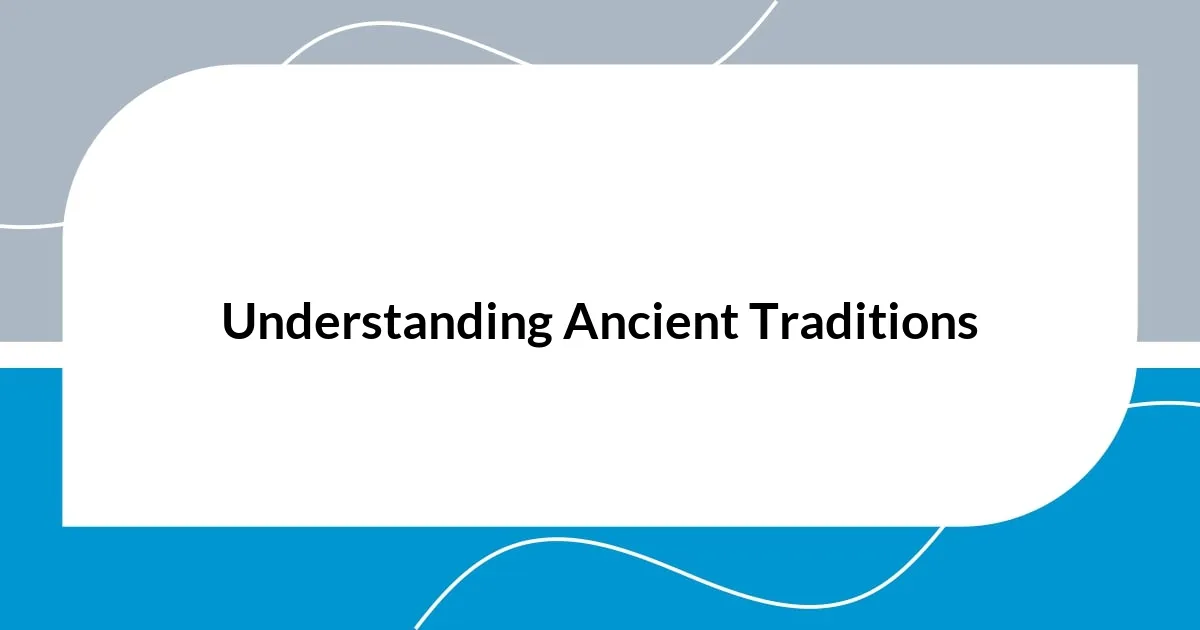
Understanding Ancient Traditions
Understanding ancient traditions goes beyond just observing practices from a distance; it’s about immersing oneself in the rich tapestry of cultural significance and emotional weight they carry. When I attended a local festival honoring ancient deities, I felt an exhilarating connection to the past. This experience made me wonder: how often do we tap into these traditions to inform our modern lives?
Each tradition holds stories that reveal the values and beliefs of those who practiced them, often serving as a bridge connecting generations. I recall my grandmother sharing tales of our ancestors’ rituals during family gatherings, and those moments felt like tiny windows into a world long gone but still relevant. Isn’t it fascinating to think about how these age-old practices can still resonate with us today?
Moreover, ancient traditions often offer insights into universal human experiences such as love, loss, and celebration. During a visit to a sacred site, I was struck by the collective reverence shown by strangers who shared a moment of silence together. I couldn’t help but feel that, despite our differences, these customs unite us in our humanity. How can embracing these traditions enrich our understanding of ourselves and each other?
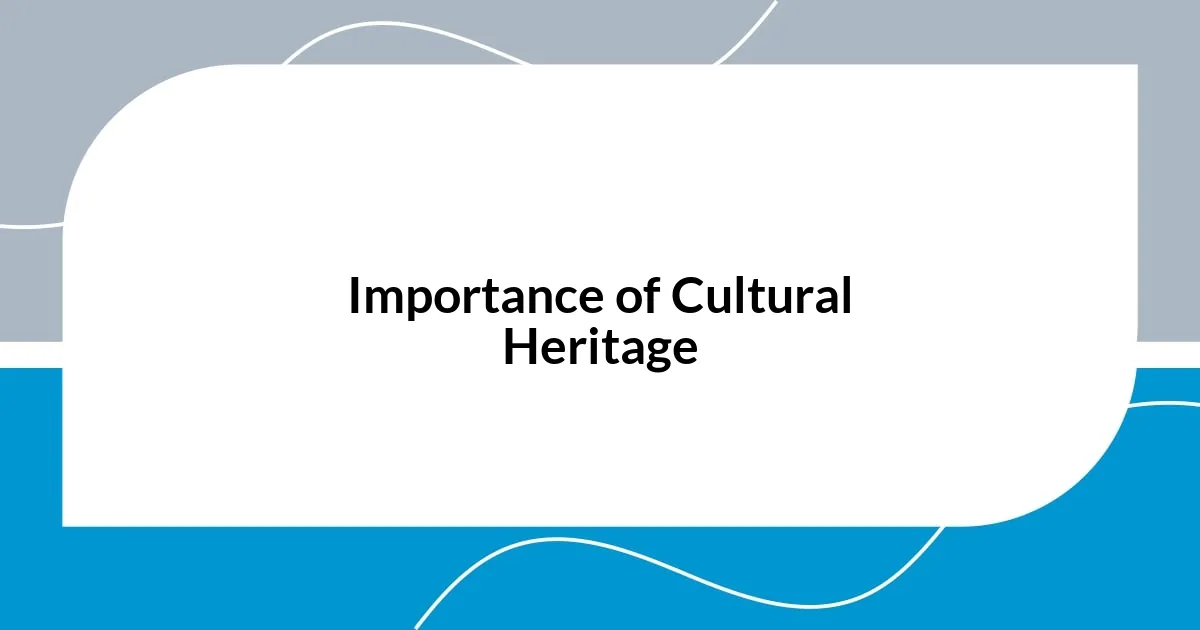
Importance of Cultural Heritage
Cultural heritage is vital because it encapsulates the identity and history of a community. I remember visiting a village where traditional crafts were still practiced, and the artisans spoke passionately about their ancestors’ techniques. This connection to the past not only kept skills alive but also fostered pride within the community. It’s powerful to witness how these traditions provide a sense of belonging.
- Connects people to their roots.
- Fosters community pride and continuity.
- Encourages the transmission of values and wisdom.
- Offers insights into societal strengths and challenges.
- Promotes diversity and mutual respect among cultures.
In my experience, exploring the depth of cultural heritage can highlight the importance of perseverance. One summer, I participated in a dance workshop that passed down ancient movements from a long-lost culture. Each step felt charged with history, reminding me how resilience and creativity can survive through generations. This experience solidified my belief that engaging with our cultural heritage enriches not only our personal lives but also our collective future.
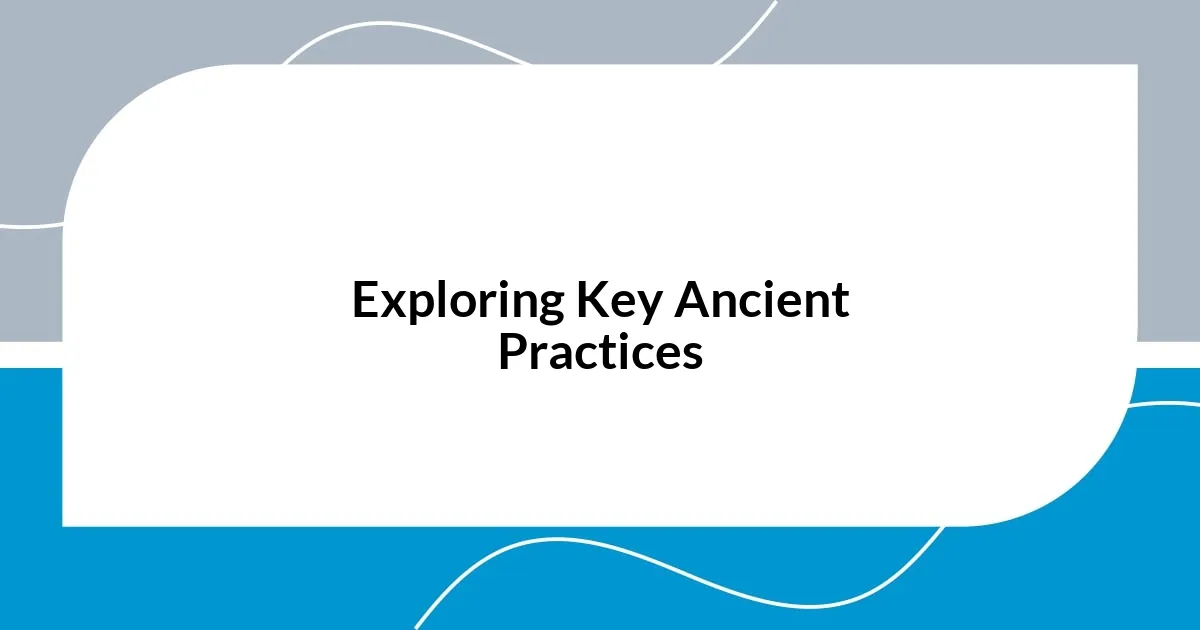
Exploring Key Ancient Practices
Exploring the ancient practices that have withstood the test of time reveals a wealth of wisdom embedded in rituals and customs. For instance, I vividly remember participating in an ancient agricultural festival, where the community gathered to honor the harvest. The rhythmic beats of drums and joyous singing created an atmosphere of togetherness, making me appreciate how these practices not only celebrate nature but also strengthen communal bonds.
One could argue that spiritual practices were central to ancient cultures, acting as a compass for moral and ethical living. During my travels in a small village in Greece, I witnessed the locals engaging in a traditional blessing ceremony. The reverence they showed reflected a deep connection to their ancestors and the earth. It made me ponder how these spiritual rituals serve as frameworks for understanding life’s complexities and uncertainties.
It’s fascinating how some ancient practices have evolved yet remain relevant today. I recently tried my hand at a pottery workshop, learning techniques that date back thousands of years. The act of molding clay felt meditative, connecting me to the countless artisans before me, whose hands shaped their communities through craftsmanship. Such experiences prompt me to think: how do we carry forward these timeless traditions in our modern lives?
| Ancient Practice | Significance |
|---|---|
| Agricultural Festivals | Strengthen community bonds through shared celebration of harvest. |
| Spiritual Blessing Ceremonies | Provide moral guidance and connect present generations to ancestral wisdom. |
| Traditional Craftsmanship | Preserve skills and foster cultural identity while enriching personal experience. |
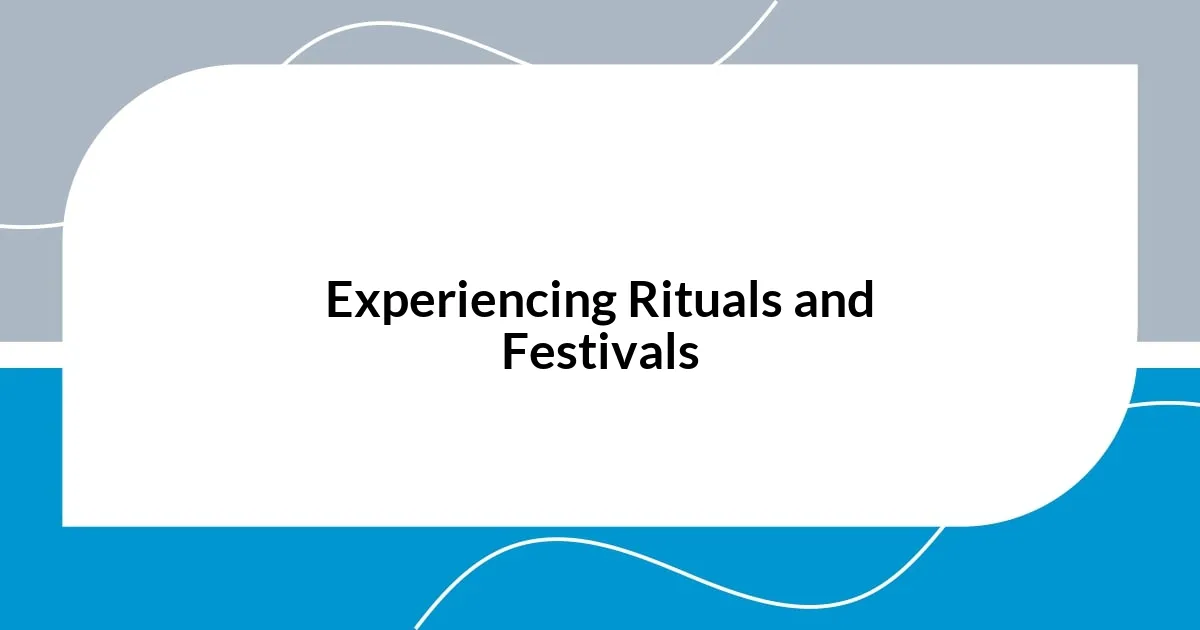
Experiencing Rituals and Festivals
Experiencing festivals firsthand is something that lingers in your memory long after the celebrations have ended. I recall attending a vibrant Diwali festival, where the night sky was painted with fireworks and the scent of homemade sweets filled the air. Participating in the lighting of the diyas, I felt an overwhelming sense of hope and renewal that transcended mere celebration; it was a personal connection to the light within us all. It’s moments like these that challenge me to think: how do such events shape our understanding of joy and community?
Rituals often serve as profound expressions of identity, and I found this out during a traditional New Year’s celebration in a small town. As the community came together to share stories and traditional dishes, a sense of warmth washed over me, reminding me how food often acts as a bridge that connects generations. Feeling the vibrancy of laughter and shared history, I couldn’t help but wonder how these customs impact our relationships and foster empathy in an increasingly fragmented world.
I often find that the emotional tug of festivals extends beyond festivity. For instance, witnessing a powerful dance during a summer solstice celebration opened my eyes to the storytelling woven into each movement. The dancer, embodying ancient spirits, stirred something deep within me. It made me reflect: how can we learn from these stories to navigate our own life journeys? Engaging with rituals not only connects us to the past but also enriches our understanding of the present.
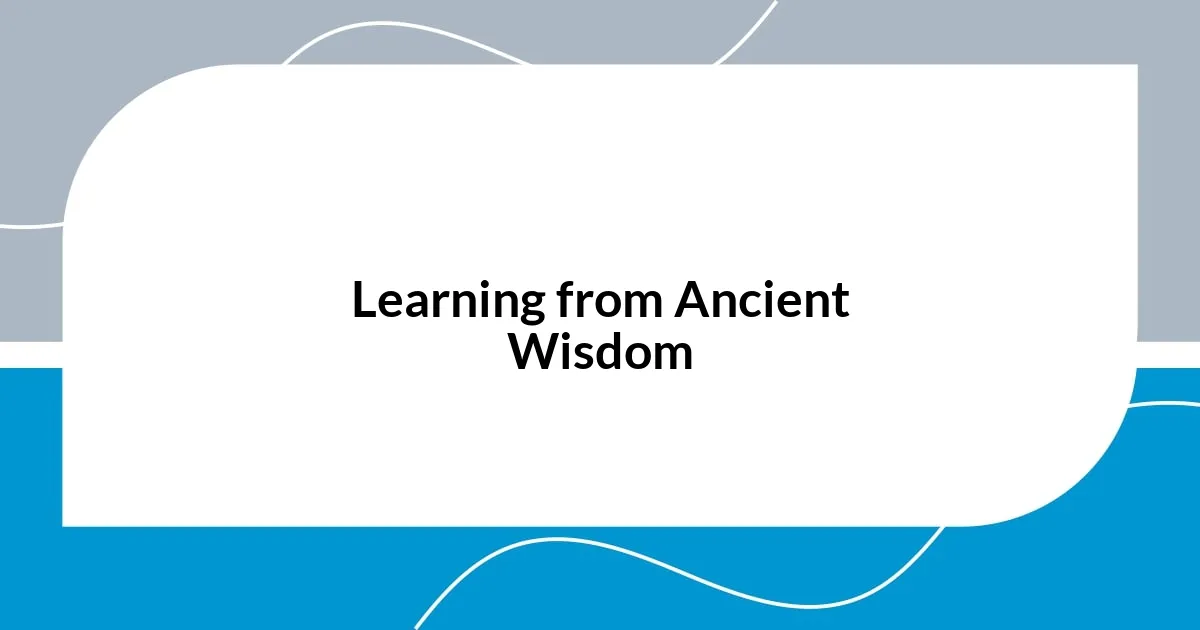
Learning from Ancient Wisdom
There’s something incredibly profound about tapping into ancient wisdom. I remember attending a shamanic healing circle, where participants were encouraged to connect with their ancestors through guided meditation. As I closed my eyes and listened to the rhythmic sounds of a drum, I felt an overwhelming sense of connection to those who walked before me. It made me ask: how often do we pause to reflect on the knowledge and strength inherited from generations past?
Studying ancient philosophies can be transformative. I recently delved into Stoic principles, which emphasize resilience and mindfulness in the face of adversity. Exploring these ideas allowed me to confront my own challenges with a more balanced perspective. It really struck me how these teachings can help us cultivate mental fortitude and emotional clarity today. Have you ever thought about how these age-old lessons can still resonate with our everyday lives?
Engaging with indigenous practices has further highlighted the importance of living in harmony with nature. While participating in a traditional ceremony led by a Native American elder, I felt a deep reverence for the earth and its cycles. As we shared stories and songs, I realized how these practices remind us of our interconnectedness. How can we integrate this wisdom into our modern routines, fostering a sustainable relationship with our planet? This is where I find ancient traditions truly shine—they guide us not just in understanding the past, but in shaping our future.
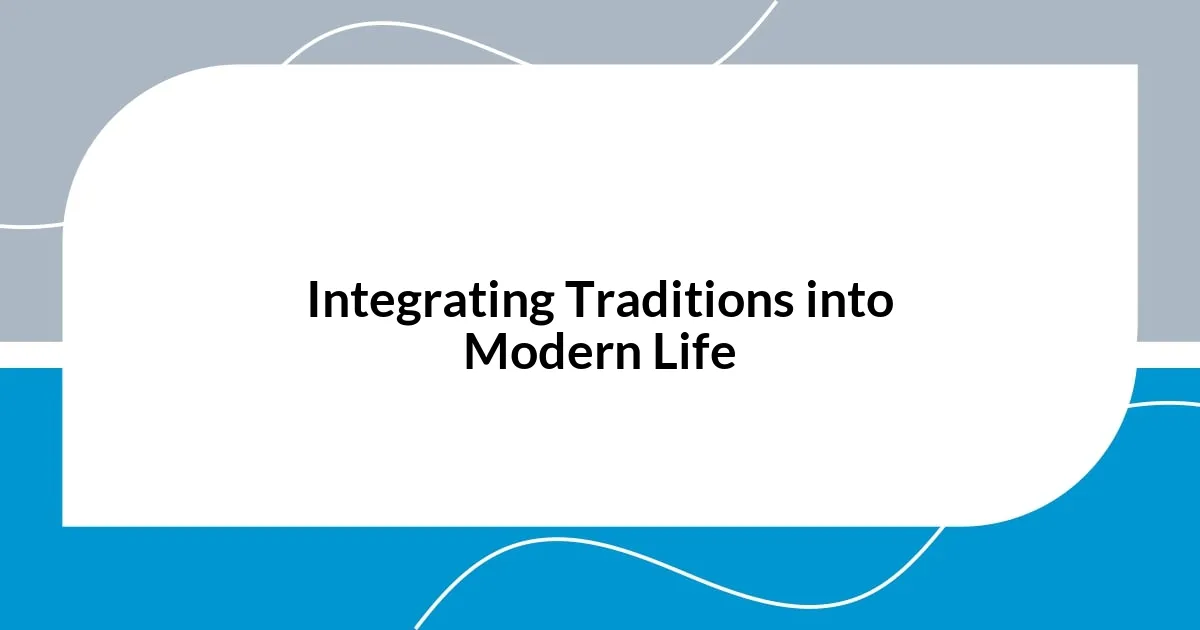
Integrating Traditions into Modern Life
Integrating traditions into modern life can often feel like a balancing act. I vividly remember a Sunday afternoon, turning my kitchen into a hub of activity as I prepared a traditional family recipe. As I chopped vegetables and stirred spices, memories of my grandmother cooking alongside me flooded back. This simple act of cooking not only nourished my body but also connected me to my roots. Isn’t it fascinating how a recipe can bridge generations and keep stories alive?
While I embrace modern technology and fast-paced living, I also find solace in ancient practices like meditation. One evening, as I sat quietly in my living room, I reflected on the breathing techniques I learned during a yoga retreat. It struck me that this ancient art offers grounding in our chaotic lives. How often do we set aside moments to breathe deeply and reconnect with ourselves? Incorporating such practices reminds me to slow down and savor life amid our hectic schedules.
Incorporating rituals into our daily routines has been pivotal for me. For instance, I’ve started ending my days with a gratitude journaling session. By crafting a list of what I’m thankful for, I’m not just acknowledging my blessings but also honoring the tradition of reflection that has been passed down through generations. It’s empowering to think that something so simple can have profound effects on our mindset and emotional well-being. How do your daily rituals serve to enrich your experience of life?
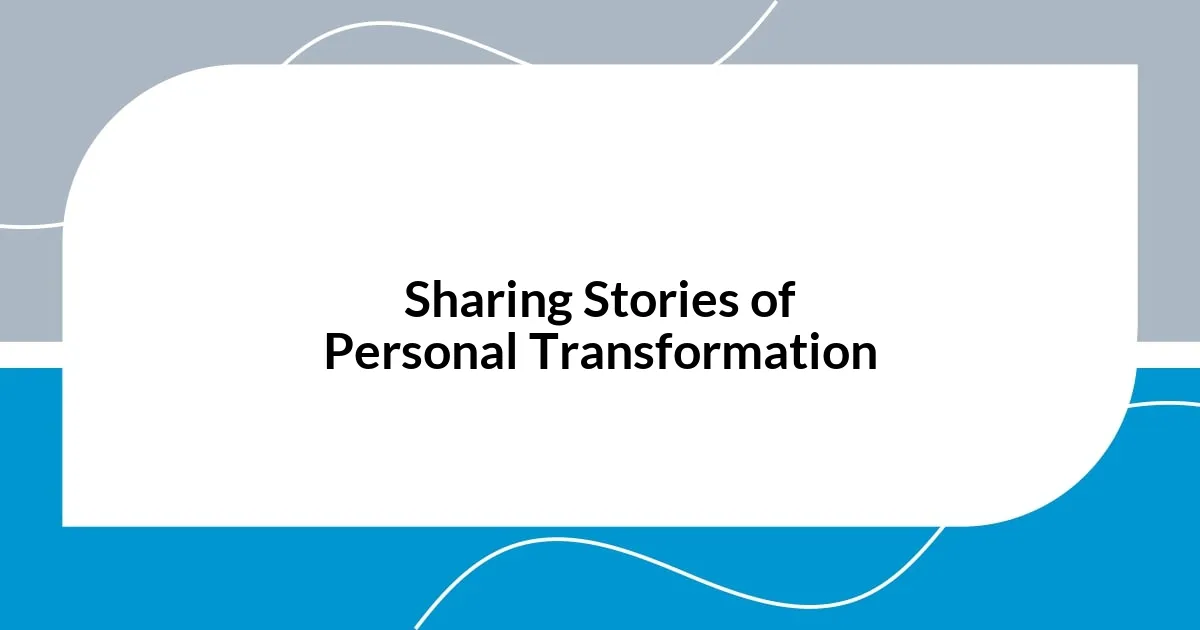
Sharing Stories of Personal Transformation
The moments of transformation that arise from sharing stories are often deeply personal and resonant. I recall a dinner gathering where friends shared their individual journeys with meditation traditions from around the world. As one woman spoke of her struggles with anxiety and how mindfulness practices helped her reclaim her peace, I felt a surge of empathy. How powerful it was to witness each narrative weaving a tapestry of resilience and hope!
Transformative stories can act as mirrors for our own experiences. A few weeks ago, I attended a storytelling workshop focused on ancient myths. Listening to participants recount their own struggles through the lens of these timeless tales ignited something within me. It made me think: are we not all heroes in our stories, faced with challenges and seeking transformation? I left that workshop feeling inspired to explore my own narrative more deeply.
It’s remarkable how sharing these stories creates a ripple effect, sparking connection and understanding among us. I still remember an afternoon spent in a circle, listening to a young man describe his journey through a cultural dance tradition that helped him connect with his identity. His vulnerability in sharing his struggles fostered a sense of community that was palpable. Have you experienced the profound connection that emerges when we bear our souls and unveil our truths? It’s in these exchanges that transformation truly blossoms.